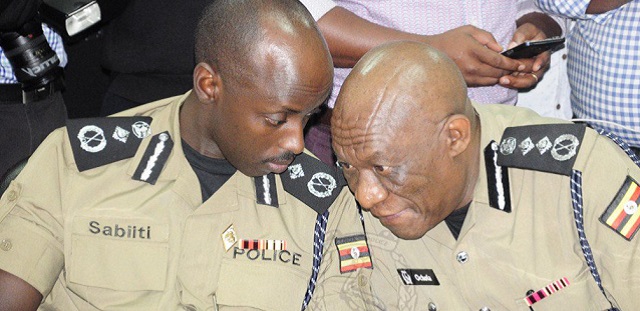
How army generals control police
To counter the escalating unchecked crime, Museveni appears convinced that a military response is required. He has since May deployed 6000 Local Defense Unit (LDU) personnel in the central districts of Kampala, Wakiso, and Mukono. The LDUs are a paramilitary group attached to the army. Museveni has previously deployed armies of crime preventers; armed vigilantes attached to police. But the direction now appears to be towards militarization of police work.
So all the army generals deployed recently will be at the rank of Assistant Inspector General of Police (AIGP) which is the rank of heads of directorates of police and just below the Inspector General of Police, John Martins Okoth-Ochola and his deputy, another army general; Maj. Gen. Sabiiti Muzeeyi.
Significantly, Brig. Bakasumba is to be head of the Chiefs of Joint Staff, a newly created position that could see him in the leading role of convening meeting of all police directors and advising the Inspector General Of Police and his deputy.
Bakasumba, who has been commandant of the army’s Peace Support Operations Centre in Singo, appears to have been carefully chosen for the policing role. The other army generals will head the police directorates of crime Intelligence, human resource development and training, and human resource and administration.
An analysis of the deployment shows that Museveni believes the police force has an attitude problem. As a result, basic crime intelligence is not gathered, the police rarely respond to emergency calls, and police stations are havens of corruption where basic services are for sell to the highest payer.
The police leadership appears to miss this general picture of a crime and incompetence-ridden force and routinely tout its excellence.
When the force released its latest crime report in last May, it focused mainly on what it claimed was a reduction in crime.
According to the report, the volume of crime reduced by 5.2% from 238,746 cases registered in 2018 compared to 252,065 cases registered in 2017. Theft, assault, and sex and economic crimes were the most registered cases.
Sex related crimes, robbery, and political and media crimes saw the biggest jump in occurrence in 2018. Murders, break-ins, and narcotics remained almost flat while theft, child related crimes, economic crimes, and general crime went down dramatically according to the police report.
But just six months into 2019, it is difficult to believe crime is going down. Instead, it appears, few cases of crime are being reported to the police. This could, in fact, be a bigger problem for the police because it appears to confirm what is generally believed; the reporting a crime to police is a waste of time and money. Victims of crime generally feel their reports will not be taken seriously. Instead, the police are most likely to use reporting a crime as a perfect chance to extort money from the victim.
The relationship between police and civilians is in tatters as the public name the police as the most corrupt institution year after year.
As a result, many crimes; from street snatching thefts, break-in, car vandalism, number plate thefts, taxi robberies, and trade in stolen motor vehicle and cycle parts is rising without being reported. The feeling of being unprotected is spreading.
Tom Katamba, the chairperson of Kampala Mobile Money Dealers Association says that they attacked because they move with cash and they feel helpless because they cannot hire safer premises.
“These killings are happening every week, every month. We are sure living under God’s mercy,” Katamba told The Independent.
“This is very little money. You can’t afford renting a shop and hiring a guard while making such profits a month. That is why most dealers resort to renting space on shop verandahs in town which are completely unsafe,” he added; commenting on the commissions they get off the business.
Meanwhile, Peter Kankaka, the chairman of Century Boda Boda Riders Association says the new wave of attacks on his members are by members of the rival Boda boda 2010 who are released from prison. He says they are the master planners of boda boda thefts around town.
“If you look at one year ago when they were in detention, the vice had died out. But now they are free and have recruited new members to begin where they stopped,” Kankaka says.
“This new police force is not listening and we don’t trust them after the experience with Kahiyura. Some of these local police connive with these thieves. We are teaming up our boda boda security and urging our members to reduce on the working time,” he adds.
He says that the attack on the boda boda rider in Rubaga was the fourth attack in that week. He said the Rubaga attacked gained publicity because it was on CCTV camera.
“I know how they work. They attack, steal the bike and kill the rider. No leaving trace. They know what leaving trace behind has caused them,” he adds.
Kankaka said most of the riders targeted are those who acquired bikes from Boda Boda 2010.
“Some riders had gotten bikes on loan and when their lenders were arrested, they jubilated. They thought they had won but these guys have come back to take back what belongs to them,” he adds.
Going forward, he says Century Boda Boda want to work with security agencies to hunt down the attackers.
Until that happens, the criminals realize there is almost zero chance of being caught – and they become even bolder. Many of the criminals know police weaknesses very well because they are either serving soldiers, police personnel, or members of the myriad private security firms set up to fill the gap left by the incompetent and overstretched police. Others are retrenched or demobilized former security personnel. Many are ex-convicts.
 The Independent Uganda: You get the Truth we Pay the Price
The Independent Uganda: You get the Truth we Pay the Price


